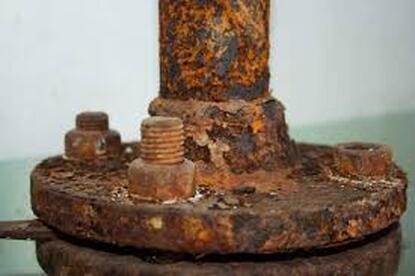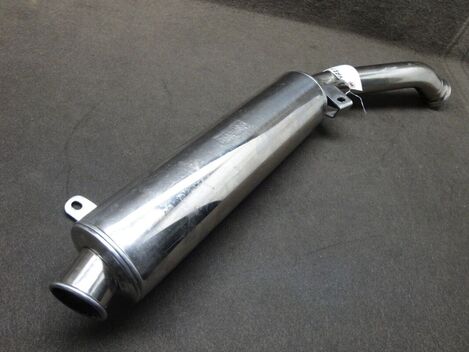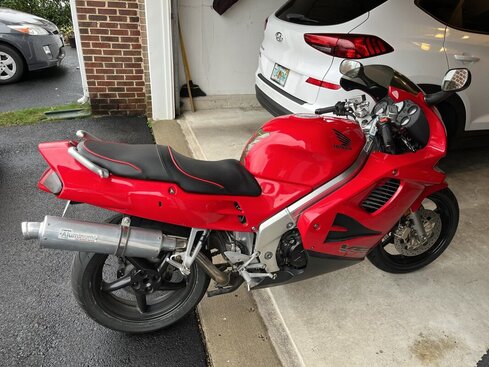
Here's their list showing breakout torque required using the different oils:
- Nothing = 516 ft. lbs.
- WD-40 = 238 ft. lbs.
- PB Blaster = 214 ft. lbs.
- Liquid Wrench = 127 ft. lbs.
- Kano Kroil = 106 ft. lbs.
- 50/50 blend of ATF and Acetone = 50 ft. lbs.
|
 It's a problem as old as the industrial revolution…how to remove rusted fasteners. Google the subject for lots of ideas, good and bad, but the first thing most of us reach for is a penetrating oil. Here's a helpful Classic Car Restoration Club article referencing a study which scientifically rated the effectiveness of various popular penetrants. Here's their list showing breakout torque required using the different oils:
0 Comments
 A few days ago I was revisiting a Motorcycle Classics magazine article from the July/Aug 2015 issue which featured Laf Young's restored 1986 VFR750F. In it, the author spoke to the transition to gear-driven cams for the 2d-gen Interceptor make-over. "Driving camshafts by gear isn't without its own issues. Gear lash can make accurate valve timing more difficult, and timing gears are noisy. To get around the lash issue, Honda used a spring mounted "scissor" gear system — essentially two gears side-by-side and slightly offset — on the cam drive gears, offsetting the teeth by roughly half of the pitch. This allowed the lash to be entirely taken up by the tension of the two teeth resting together. The gear-driven cams went on to be a key feature of the later VFR750R." I've just completed mechanical checks on Project 39, a '93 VFR750, which required removal of the cam gears in order to change the valve shims during the adjustment procedure. In the above photo, the removed cam gear is no longer under spring tension so the offset is clearly visible.  (Right) Here, the cam gear is back in place and the scissor gears are back in alignment. This is an example of yet another hidden bit of technology which make our VFRs a bit more special than the rest.  For us hobbyists, Harbor Freight stores can be an economical source of supplies and tools. For the professional who needs to count on his or her tools for their income, then a step up in quality may be in order. Here's a case in point. I have this thermometer which I mostly use for measuring exhaust pipe temperatures on startup to determine if all a bike's cylinders are combusting equally. That way I can be confident that a freshly rebuilt carb set has functioning choke systems, for example. Aim it at the outlet side of the thermostat housing and you're able to determine when the thermostat opens. Easy to use — just pull the trigger for an instant temperature reading. There's also a selection of settings which help the tool give accurate readings on differing surfaces. Hurry, this price ends December 4. I recently took inventory of my carb stash and found several sets are patiently awaiting their turn in the ultrasonic cleaner for a cleaning and rebuild. The final step of the process is to mount them on a running bike for operational checks and syncing. Well, with Project 40 sitting idle while I wait for some parts, I have a perfect place to take care of the tuning part, at least for the 2d-gen carbs. One of the cool parts of Project 40's build is mounting a set of freshly restored period Kerker slip-ons. I've never had a dual Kerker system in the shop and was anxious to hear them on the bike. The mufflers got treated to hours of rust removal and fresh black paint, and several more hours spent on the aluminum canisters and end caps. I also repacked them with fiberglass mat. I think they sound great! A camera phone can't really capture the sound and we're stuck inside a garage, but so far I like 'em. I've recently rolled Project 39, a 1993 VFR750, onto the lift for its preliminary mechanical checks in preparation for its first start in many years. After stripping the bodywork, carbs and radiator, I gave it a once-over with compressed air to remove any debris that might get into the engine internals when the cams are exposed. In the process, I found that the clutch and alternator covers are riddled with underlying corrosion, allowing the paint to blow right away. I've no way of knowing if they had been repainted at some point, but I sure hope that the covers are salvageable when their time comes.  Click on image for the eBay link Click on image for the eBay link I don't see these come up very often, at least not in serviceable condition. This Staintune slip-on should fit the 1994-97 VFR750 with two mounting points in addition to the flared header mount. I'm assuming the finish is stainless steel, so it won't respond to refurbishment as easily as aluminum, but the seller states, "No dents, scrapes, holes, or leaks. Usual light scratches in the finish." I can't tell if this is a high or mid-mount but judging from the length of the mid-pipe I'm thinking high mount. In any case, a useable Staintune slip-on for $194.40 shipped is what I consider a fair deal. For a more complete photo tutorial on modifying the front & rear fenders on the second-gen VFR, see the "Maintenance" page, #35. ……………………….. Reader Scott sent along some photos of his very clean rear fender bob on his VFR700 F2. The 2d-gen's fender is a separate extension piece which bolts to the main fender structure, while the later bikes were a single unit. This allows a complete removal of the extension and bolting on an aftermarket metal license bracket. Another approach is to shorten the existing fender, eliminating the bottom reflector and even the bulky license plate light, if desired. This is the route Scott took and he did a smooth job of it. Remember, most, if not all, states require a rear reflector and license plate light, so proceed accordingly. Scott solved the lighting question by wiring in LED lighted license bolts. You can also source a stick-on LED light and mount it to the bottom of the tail light. He traced out the side curve using an 18-inch wheel rim, then ground the shape with a bench grinder stone. The side of the stone produced a straight lower edge. He then finished up with sandpaper to smooth and round the edges. Comparing Scott's to the OEM fender in the photos below, you can quickly see how the modification visually lightens the rear of the bike and yet retains the original style line. And how about those dual Jardine mufflers? I've never seen this option, Scott telling me he purchased the kit, new, off eBay many years ago. They originally sported a shiny aluminum finish, so that might be a rewarding future project for Scott. He adds that they're "very open and loud." Other changes to the bike include a Corbin seat and Fox remote reservoir shock.
Reader Brian has been working with his friend, Dave, to bring Brian's 1986 VFR700F back on the road. Brian has owned this Interceptor for nearly 32 years, through many long-distance moves all over the U.S., amazingly without a scratch. Brian even states, "I haven't dropped it…it has really never been dirty." Now with some 20,000 miles, the bike was in need of a thorough maintenance regimen, and that's when Dave made contact with me for some advice and encouragement.
But it's Brian's backstory that explains his deep connection to this motorcycle. Enduring a difficult and traumatic childhood that would leave most of us scarred and bitter, Brian used some of his young Mother's estate to buy this bike. In his words, "to put it mildly, we were a family that had little, sometimes no food, ratty clothes, etc. When my mom died young I was 25, she gave me my proceeds from her estate, and I used that to buy the VFR, catching it at low tide, I think. $2500 for a mint VFR with 6k miles was a steal even then. Now you know why I have vowed to never sell it!" Another case where our machines can represent more than the sum of their parts. Thanks for sharing, Brian.  Click on image for the VFRworld.com link Click on image for the VFRworld.com link What: 1995 VFR750F Where: Chantilly, Virginia Why: Fair price, ready-to-ride Price: $2500 OBO The last and most refined of the carbureted VFRs, this generation boasts performance, comfort and the built-in class of the unique (at the time) V4 powerplant — and this example will sing the V4's music with the addition of a Two Brothers slip-on muffler. With 29,000 miles, the bike also includes an aftermarket seat (seat cover?), new rectifier, fork seals, tires, battery and fresh fluids. It could benefit from a detailing but this bike represents a great buy for a classic sport touring bike, something the VFR line excels at. |
THE SHOP BLOG
|